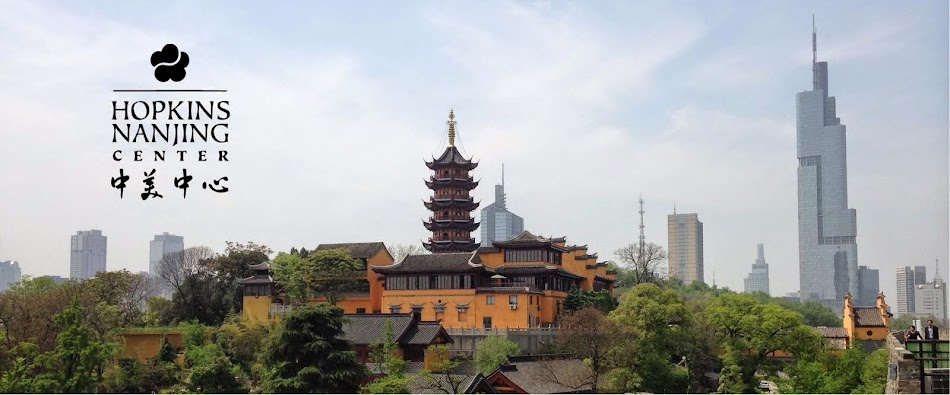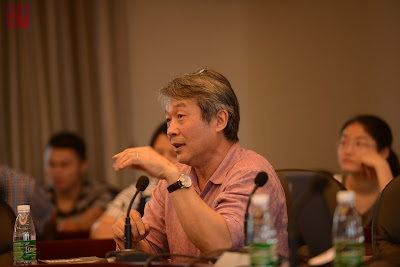The 2016 presidential campaign got plenty of attention at the Hopkins-Nanjing Center. Students, faculty, and staff kept a close eye on events back home via cable TV, the internet, and social media, and the center hosted a slew of lectures and forums that enabled members of the campus community to share their thoughts on what this election means for Americans and for the rest of the world.
 |
| Chinese newspapers report the U.S. election results |
Also in September and October, our tech specialists live-streamed the presidential and vice-presidential debates in the Kuang Yaming auditorium. For those of us accustomed to watching political debates at night, the 9 a.m. starting time made for some interesting viewing. While the folks back home were gathering at debate parties or curling up in front of their televisions, we at the HNC were downing coffee and carving time into our busy morning schedules. As always, the debates were great fun, and the audience dynamic made for a nice shared experience. I walked away thinking that watching a debate is a bit like enjoying a steak and a shot of bourbon – maybe it’s better to do these things after sundown, but sometimes you’ve gotta break the rules.
On October 25, the U.S. Consulate sponsored a lecture by Associate Professor Nicholas J. G. Winter of the Department of Politics at the University of Virginia. Dr. Winter, who specializes in public opinion, political psychology, and statistical analysis, explored the election process, the latest polling data, and the roots of Donald Trump’s popularity. He began with a straightforward, “Civics 101” description of the American political system, and then moved on to a sophisticated analysis of the latest data on voter behavior and demographic trends. It was a well-balanced approach that appealed to novices and experts alike. (Pressed by his audience, Dr. Winter wisely refused to make any predictions about the election outcome.)
 |
| U.S. Ambassador to China Max Baucus addresses the HNC community |
Two nights later, HNC faculty hosted an open forum on globalization and the election. We addressed many of the macro-level questions that have puzzled the pundits in 2016: Why have so many voters embraced outsider candidates? Is the Trump/Sanders phenomenon part of the same worldwide trend that has spawned the Brexit vote and the return of European populism? Are we witnessing a major political realignment in America? While I cannot claim that we predicted the election result, we did explore many of the larger trends that are now at the center of the experts’ election postmortems. These include stagnant wages, controversial trade agreements, growing class disparities, contentious immigration policies, changing demographics, the rising cost of healthcare and education, and – perhaps most significant of all – public frustration with political, economic, and media elites.
On November 3, HNC Student Career Counselor Robert Shields delivered a lecture on the 2000 election and the court cases that grew out of the contested vote count in Florida. It was an intriguing lesson in federalism, equal protection laws, post-election partisanship, and the difficulties of enforcing state election statutes while also ensuring the rights of voters. Shields taught those who were too young to remember (and reminded those who are too old to forget) about everything from “hanging chads” to the infamous Palm Beach County “butterfly ballot.”
The capstone of the 2000 election story is the case of Bush v. Gore (531 U.S. 98), in which the Supreme Court ruled 5-4 that the Florida Supreme Court’s decision to order a recount only in certain counties had violated the equal-protection clause of the Fourteenth Amendment. With the halting of the recount, George W. Bush won the state and, ultimately, the presidency. Although we have largely avoided similar fights over state vote counts since 2000, there is at least one major parallel between 2000 and 2016: the election winner lost the popular vote. Thus the 2016 outcome has already spurred further debate about the necessity of the Electoral College.
 |
| HNC Students watch the election broadcast |
Much like everyone back home, we watched the returns with a combination of surprise, exhilaration (among Trump supporters), and bemusement (among Clinton supporters and “anybody but Trump” voters). One professor who had closely watched the Brexit returns in July suggested that the real-time sentiment was much the same in this case. The polls had predicted a particular outcome, but as the day wore on we were reminded that it is the voters who ultimately decide these things, not the journalists or the pollsters.
A week after the election, a large group turned out for our final faculty/student forum on what the results mean for America and the world. Does Trump’s victory represent a protest vote against our country’s political and economic elites? Does the result prove the strength of reactionary tendencies in American society? With a nod to Plato, is America a nation more like “two cities that are at war with each other?” It was a very fruitful discussion, and as always the students’ comments were sharp and insightful.
 |
| Election results broadcast at the HNC |
A few final thoughts. We may live in cynical times, but we would do well to recall that our forebears, too, endured flawed leaders and imperfect systems. In one of Plato’s more acerbic passages in The Republic, he called democracy “a charming form of government, full of variety and disorder, and dispensing a sort of equality to equals and unequaled alike.” Alexis de Tocqueville, that most astute foreign observer of American life, wryly observed 180 years ago that “a democratic government is the only one in which those who vote for a tax can escape the obligation to pay it.” The great American author H.L. Mencken was just as wary of the voters as he was the politicians. “Democracy,” he wrote nearly a century ago, “is the theory that the common people know what they want, and deserve to get it good and hard.”
Clearly the quest for effective governance is never-ending. Whatever one may think of the election results, perhaps it’s best not to let the perfect be the enemy of the good. With our students offering plenty of inspiration throughout this election season, I remain optimistic that our republic will be just fine in the long run.
Written by Joe Renouard, PhD
Resident HNC Professor of American History








